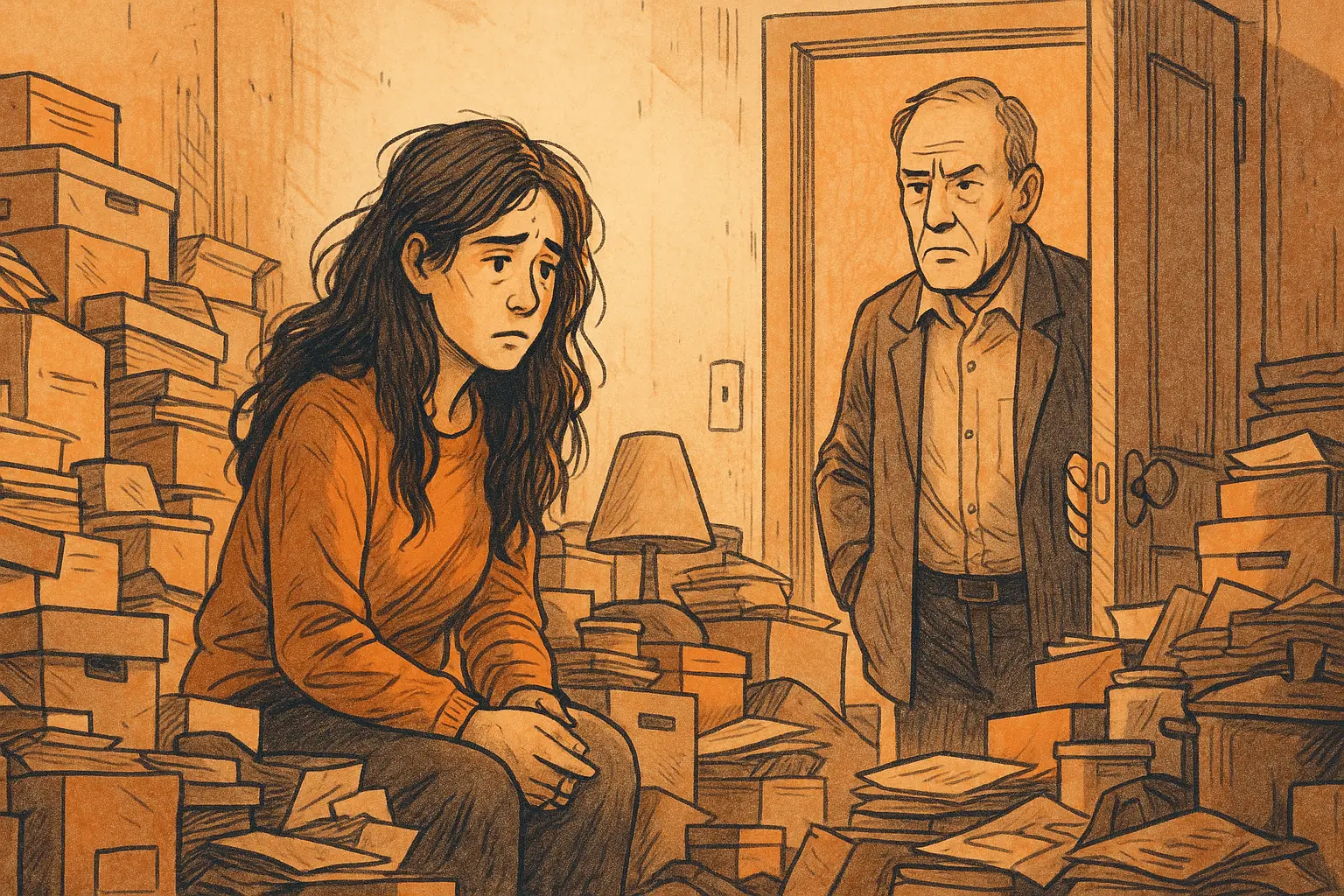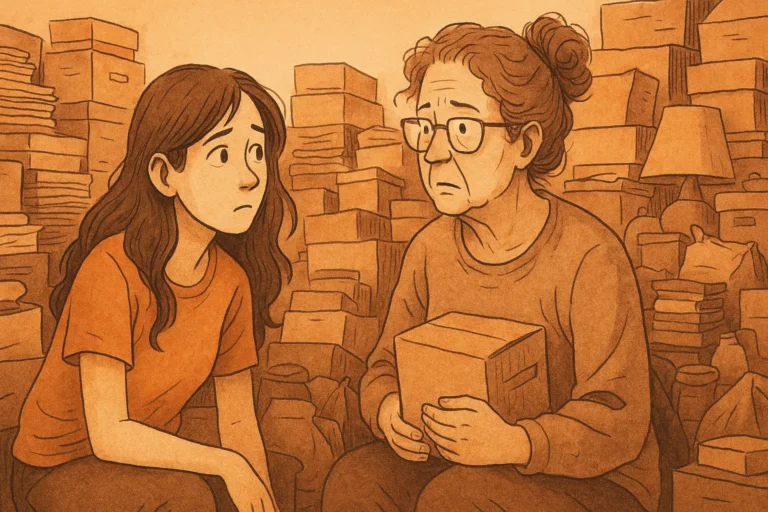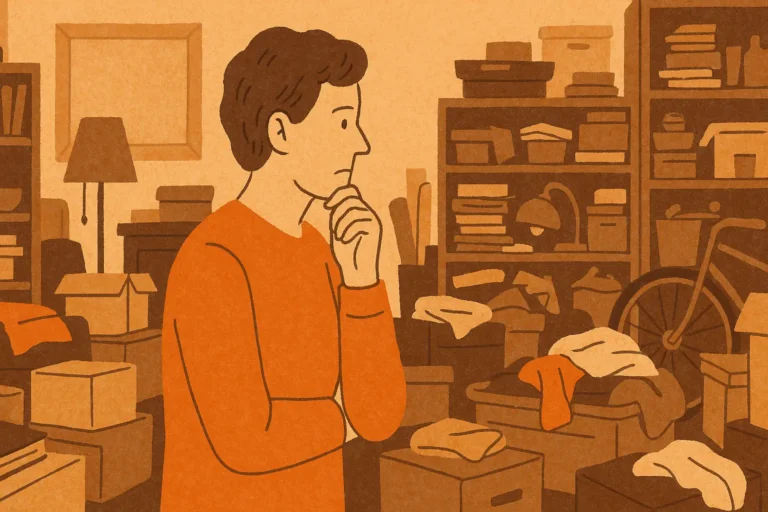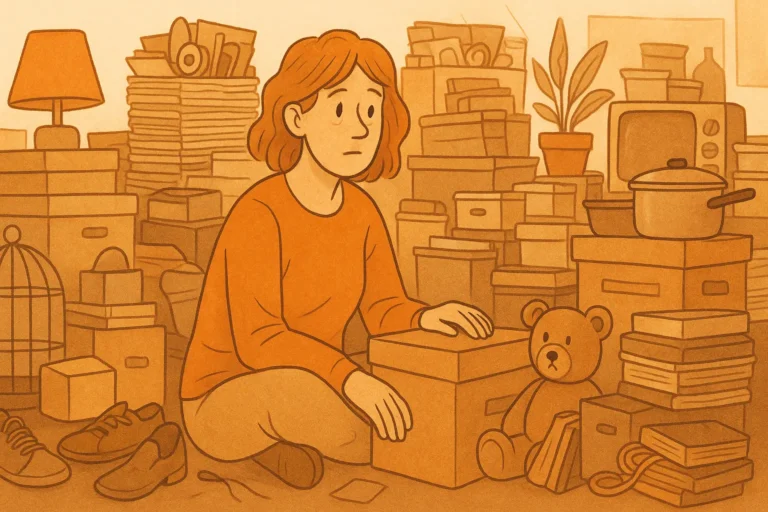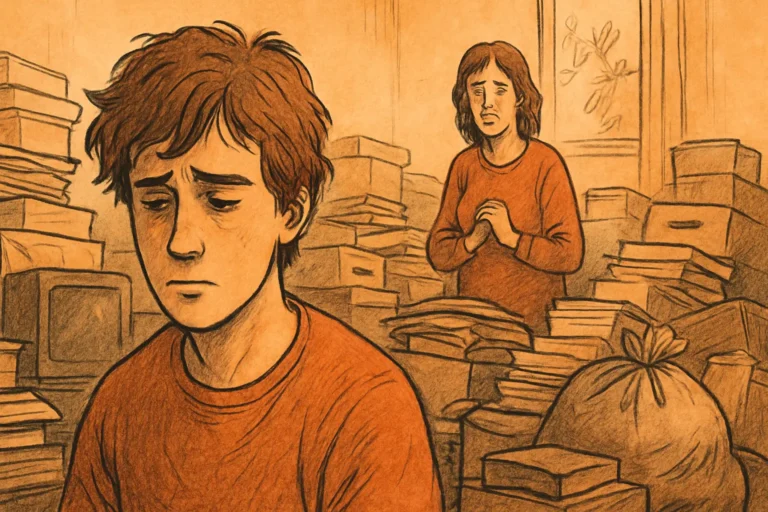What to Do if My Landlord Finds Out About My Hoarding Habit
If you’re reading this, chances are you’re worried. Maybe your landlord has already discovered your hoarding, or you’re afraid they will soon. This can feel overwhelming.
The good news is: you’re not the first person to go through this, and you do have options. In this post, I’ll walk you through exactly what you can do if your landlord finds out about your hoarding habit.
I’ll also give you some practical tips for protecting your housing situation and starting to make progress in a way that feels safe and doable.
First: Take a Deep Breath
When your landlord finds out about your hoarding, it’s easy to panic. You might think:
- “I’m going to get evicted immediately.”
- “I’ll be homeless.”
- “I’m in trouble.”
While these fears are understandable, it’s important to pause. In most cases, landlords can’t just kick you out overnight. There are legal steps they have to follow. You usually have time to make changes, show effort, and work with them.
So the very first thing to do is to calm yourself enough to think clearly. That way you can take the right next steps instead of acting out of fear.
Why Landlords Care About Hoarding
It may help to understand why landlords even care about this issue.
Hoarding can cause:
- Health and safety hazards (blocked exits, pests, mold, fire risk).
- Property damage (stains, structural damage, overloaded floors).
- Complaints from neighbors (smells, pests, clutter visible outside).
From a landlord’s point of view, these things can create legal liability. If the property isn’t safe or other tenants complain, the landlord has to take action.
Knowing this helps you see the situation from their perspective. They’re not necessarily against you as a person. They’re concerned about risk.
Step 1: Review Your Lease
When your landlord finds out about your hoarding, the first practical step is to check your lease agreement.
Look for:
- Cleanliness clauses – Many leases require tenants to keep the property “clean and sanitary.”
- Safety clauses – Some leases specifically mention fire hazards or blocking exits.
- Pest clauses – If pests are found, the tenant may be responsible.
Knowing what your lease says will help you understand where you stand legally. It also tells you what your landlord could use as grounds for a warning or eviction notice.
Step 2: Understand Your Rights
Landlords can’t usually evict someone on the spot. Depending on where you live, they may need to give:
- A warning notice – Time to correct the issue.
- A “cure or quit” notice – You must fix the problem or move out.
- A legal eviction process – Court filings, hearings, and official orders.
If you live in the U.S., hoarding is sometimes seen as a disability under the Fair Housing Act. That means landlords may need to give you a chance to make reasonable changes before evicting.
This doesn’t mean you can ignore the problem—but it does mean you may have legal protections. If you’re very worried, you could reach out to a local tenant advocacy group or legal aid office.
Step 3: Communicate with Your Landlord
It may feel tempting to hide, avoid phone calls, or hope the problem goes away. But avoiding your landlord usually makes things worse.
Instead, try being honest (but brief). You don’t need to share your whole life story, but you can say something like:
“I understand your concerns. I’m taking steps to address the clutter and make the place safer.”
This shows you’re aware of the problem and working on it. Many landlords are more willing to work with tenants who show effort than with those who ignore the issue.
Step 4: Make a Plan to Show Progress
You don’t have to fix everything overnight. In fact, with hoarding, that usually isn’t possible. What matters most is showing that you’re making progress.
Here’s a simple way to do that:
Break it into small steps:
- Start with one area your landlord is most concerned about (like hallways, exits, or the kitchen).
- Focus on safety first, not perfection.
Take photos:
- Snap “before and after” pictures to document your progress.
- You can show these to your landlord if needed.
Set realistic goals:
- For example, “Clear the hallway this week,” instead of “Declutter the whole apartment.”
This not only helps your landlord see change, but it also keeps you from feeling so overwhelmed.
Step 5: Get Support
Dealing with hoarding alone can feel impossible. If you can, consider getting support. Options include:
- Professional organizers who specialize in hoarding – They understand the emotional side of this, not just the physical mess.
- Therapists – Especially those trained in Cognitive Behavioral Therapy (CBT) for hoarding.
- Support groups – Online or in-person groups where you can talk with others who understand.
- Trusted friends or family – If they’re supportive and non-judgmental.
Having even one person on your side can make a huge difference.
Step 6: Focus on Safety “Quick Wins”
Landlords usually care most about safety issues. That means you can make a big difference by targeting a few quick fixes:
- Clear doorways and hallways so exits aren’t blocked.
- Make sure smoke detectors work.
- Get rid of trash or spoiled food that could attract pests.
- Keep the bathroom and kitchen somewhat usable.
Even if the rest of the home is cluttered, tackling these areas first can buy you goodwill and time.
Step 7: Be Proactive, Not Reactive
If your landlord hasn’t given you a notice yet, use this time wisely. Start working on small improvements now so that if they come back to check, they’ll see progress.
If you’ve already received a warning, respond quickly. Even a little visible progress can show that you’re taking it seriously.
Step 8: Know When to Seek Legal Advice
If your landlord threatens eviction or has already started the process, you may want to talk to a tenant lawyer or local housing authority.
They can tell you:
- Whether your landlord followed the correct legal steps.
- What your rights are under disability and housing laws.
- What options you have to delay or fight eviction.
This doesn’t mean you should ignore the hoarding issue, but it gives you more confidence in handling the situation.
A Note About Shame
Many people with hoarding disorder carry a lot of shame. When a landlord finds out, that shame can feel crushing.
But here’s the truth: You are not your clutter. Hoarding is not a moral failing—it’s a condition that millions of people deal with.
The fact that you’re reading this article means you care and you’re looking for solutions. That’s something to be proud of.
Moving Forward
Here’s a quick recap of what to do if your landlord finds out about your hoarding habit:
- Take a deep breath. You likely have more time than you think.
- Review your lease so you know where you stand.
- Understand your rights under housing laws.
- Communicate briefly and respectfully with your landlord.
- Make a plan to show progress, even small steps.
- Get support from professionals or loved ones.
- Focus on safety quick wins first.
- Seek legal advice if eviction seems possible.
You don’t have to solve everything today. But by taking small, steady steps, you can protect your housing situation and start making progress toward a safer, calmer home.
Final Thoughts
When your landlord finds out about your hoarding, it can feel like the end of the world. But it doesn’t have to be.
By staying calm, showing effort, and getting the right support, you can often work things out without losing your home.
And even if this situation feels scary right now, it can also be the push that helps you take the first real steps toward change.

